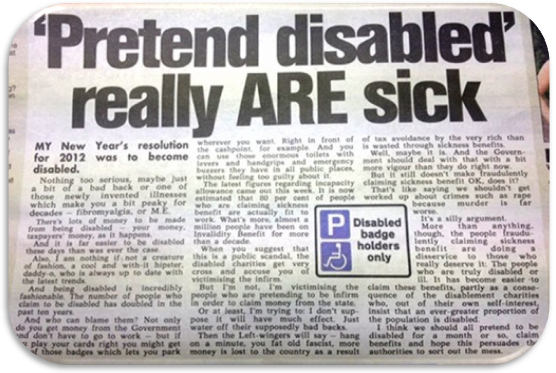 Published: 17 February 2012
Published: 17 February 2012
Region: UK
By Radman Selmic

In times of economic and social austerity it is often the most vulnerable people in society who feel the greatest pain. Their pain can be made even worse when loose talking politicians and intemperate media coverage combines to threaten the very idea of welfare support and a spirit of solidarity and humanity.
This concern arises because political discussion regarding cuts in the budget allocated to disabled people has sparked a broader media debate which goes far beyond the sphere of financial support and budgeting.
The issues are sharply outlined in four recent newspaper articles which have appeared in response to a welter of media coverage of unscrupulous cheats who have claimed benefits even though they can work and live normally without support.
These shameful frauds should be, of course, unmasked, criticised and the people responsible brought to justice. However, when these cases are presented without context or a sense of proportion and balance, there is a risk of simplistic labelling the whole population of disabled people as cheaters and scroungers.
Who can tell, for example, what immeasurable damage was done to the cause of public support for people with disabilities by an article written by Rod Liddle in The Sun. In this piece he says one of his New Year resolutions for 2012 resolution is to be disabled for a month, because it is so easy to get benefits without proper reasons:
“My new year’s resolution for 2012 was to become disabled. Nothing too serious, maybe just a bit of a bad back or one of those newly invented illnesses which make you a bit peaky for decades – fibromyalgia, or ME … I think we should all pretend to be disabled for a month or so, claim benefits and hope this persuades the authorities to sort out the mess.”
The danger in this is a one-sided depiction of the whole population of disabled people while emphasising the need for better control or firmer procedures in the benefits system. It cannot be forgotten that disabled people are the most vulnerable part of our society, their life is comlex and uneasy enough even without ill-judged commentary which could make them feel disparaged, humiliated or despised by the rest of society.
On the other hand, in response to offensive and manipulative media coverage, disabled people shouldn’t be presented in the media as pitiful, depersonalised and separated from the rest of the society. As Frances Ryan brilliantly emphasised in the Guardian in answer to Liddle (available here), disabled people need more personal consideration which recognises them as dignified members of society, who seek to live a normal life as much as possible despite their handicaps. They don’t need just empathy but also respect mixed with the solidarity.
In another case, the METRO Newspapers (February 8), Hayden Smith wrote an article with the provocative though, as the article reveals, purely sensationalist headline – “Disabled man tells judges: I cannot live on £85.000 a year”. The article points out that the man has been blind since birth, has “learning difficulties” and “constellation of other problems” and lives in a “lot of pain”. The fact that he needs more than £85.000 a year has nothing to do with greed, but much more to do with his desire to live with dignity.
A final, and perhaps most telling comment, comes from the Evening Standard and Ian Birell who notes the “decline in sympathetic articles – not just in tabloids but in broadsheet and on the BBC” on disabled issues. He considers the broader importance of the case and the substantial damage which could be done to a society when it starts lacking solidarity and compassion.
His article contains a powerful message for all journalists when covering issues related to people with disabilities. “There is nothing wrong in stopping fraud or imposing cuts at a time of austerity,” he says. “But it is revolting to see politicians and the media collude to target people who just want to join society”.